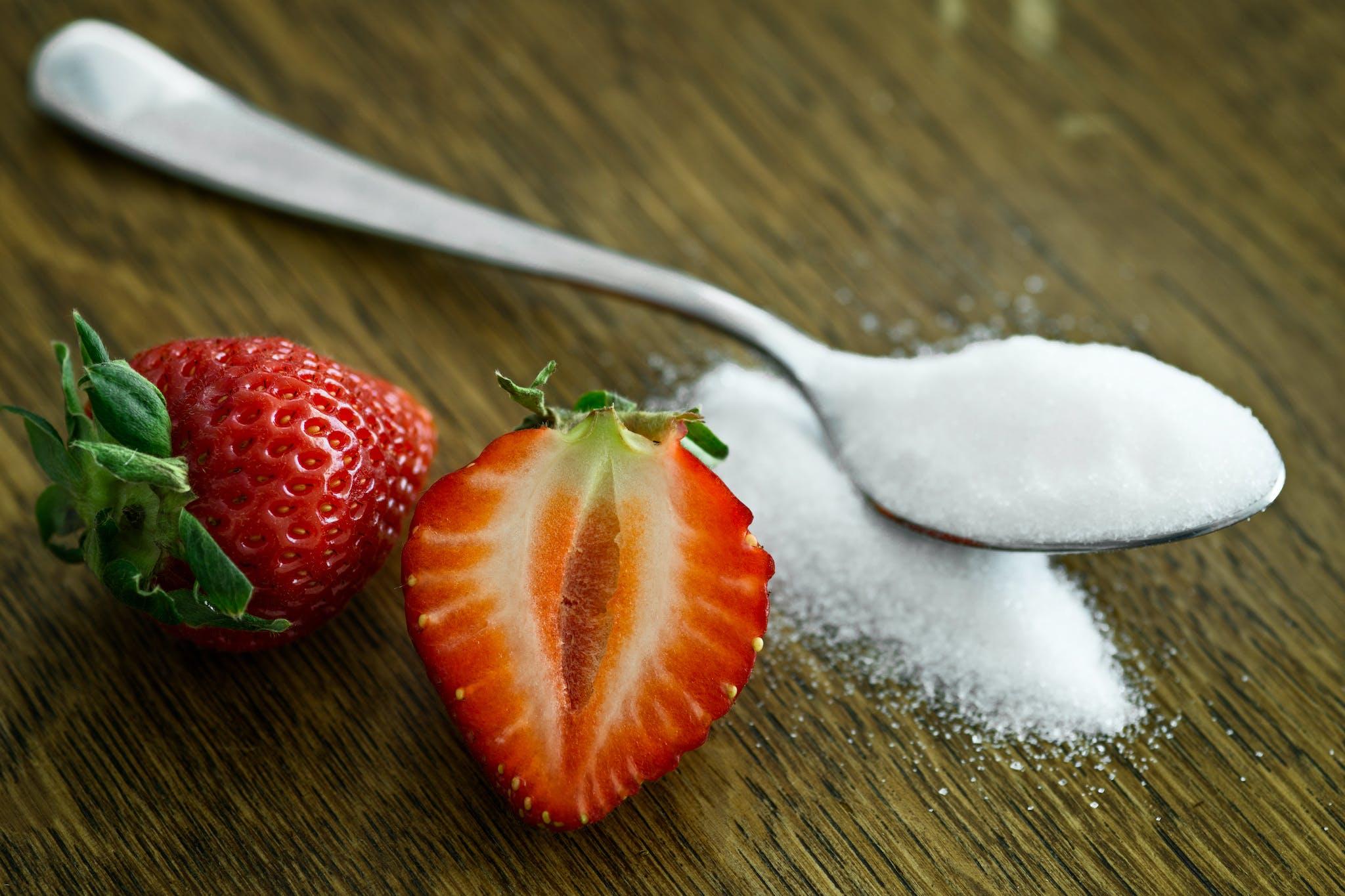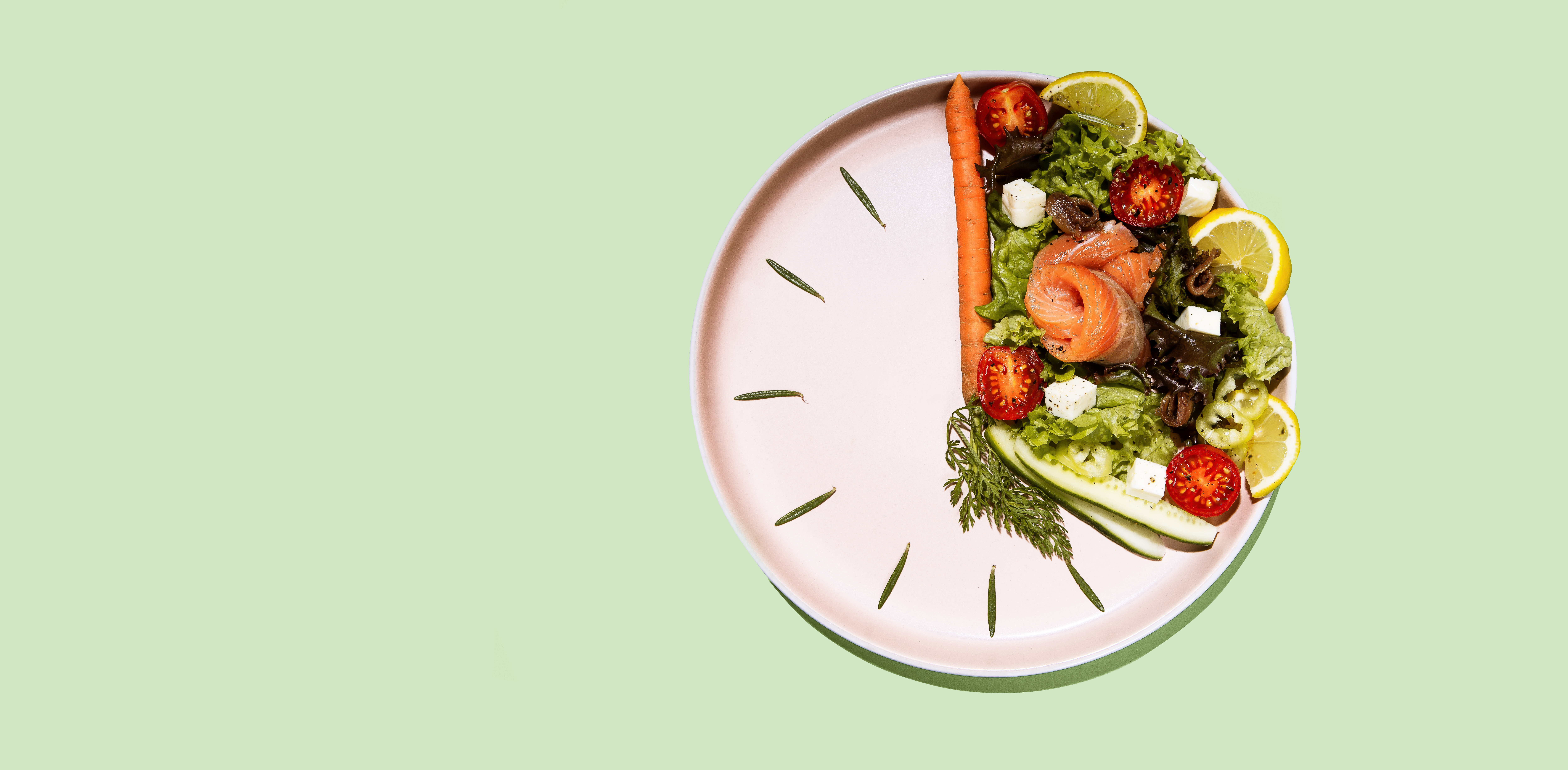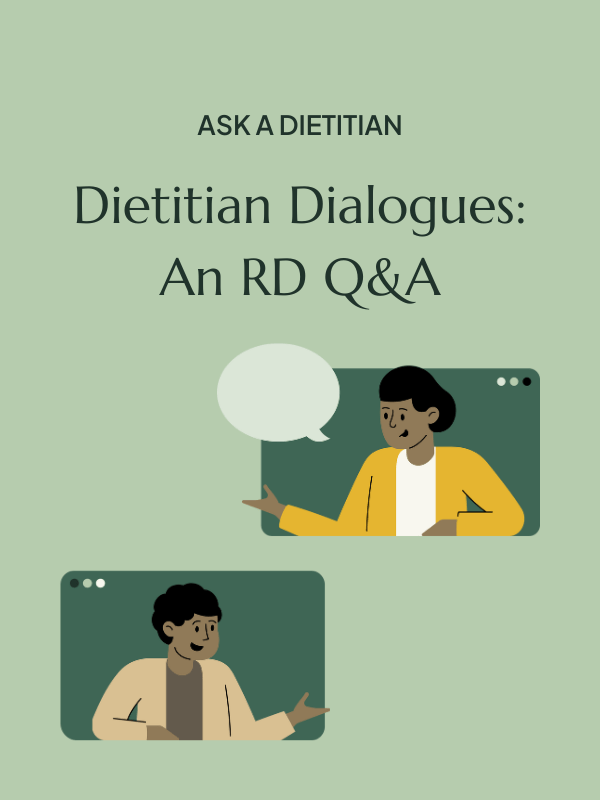Considering cutting out sugar? If so, you’re not alone. Whether you’re focused on weight management, or concerned about acne caused by sugar, you’ve probably heard rumors about the not-so-sweet consequences of sugar consumption.
But is sugar really that bad for you? Our dietitians break down the science below.
What is sugar?
At its most basic level, sugar is a building block for carbohydrates. One unit of sugar, known as a “mono-saccharide,” can exist on its own in a few different forms. Glucose, fructose, and galactose, are all monosaccharides that can be found in nature.
Monosaccharides can also combine to create “di-saccharides.” Mono- and di-saccharides are known as “simple carbohydrates.” These natural sugars can be found in many whole foods, such as fruits and vegetables. Whole foods that contain natural sugars also have fiber, vitamins, and minerals.
Sugar must be removed from whole foods and highly processed to create the refined sugar we typically use in the kitchen. The end product of this process lacks the vitamins and minerals typically found alongside natural sugars.
Different types of sugar
Sugar comes in many different forms — some of which affect us differently than others. Let’s dive into the details!
Glucose
Glucose contains 4 calories per gram, and is commonly found in fruits, vegetables, dairy, and honey. This type of sugar is used as the main fuel source for our bodies. When two molecules of glucose are combined, they form “maltose.” One natural source of maltose is malted grains.
Fructose
Fructose has 4 calories per gram, and is known for being much sweeter than the other natural sugars. This type of sugar can be found in fruits, vegetables, and honey. When fructose is combined with glucose, they form a disaccharide called “sucrose”—which, once processed, is more commonly known as table sugar.
Galactose
Like glucose and fructose, galactose also contains 4 calories per gram. You can find galactose in dairy products and in fruits and vegetables, such as persimmons and red peppers. When galactose is combined with glucose, a disaccharide called “lactose” is formed. Lactose is a type of sugar that is frequently found in dairy products.
Added sugar
If you take a look through your kitchen fridge or pantry, you’ll find numerous items with added sugars. Whether it’s yogurt, condiments, drinks, or packaged snacks; even items that may be advertised as “healthy” can have sugars added. Yikes! Added sugars are just what they sound like: extra sugars that are added into foods. The source of the sugar doesn’t matter—if it’s added as an ingredient, it’s added sugar.
This being said, two types of sugars exist: natural and refined. Natural added sugars include honey, agave nectar, and maple syrup. They are minimally processed, and retain many vitamins, minerals and antioxidants. Refined sugars have undergone more significant processing. These include table sugar, cane juice, corn syrup, and high fructose corn syrup, among others.
Artificial sweeteners
Artificial sweeteners, such as non-nutritive sweeteners, are laboratory-produced substances. Currently, only six are approved by the FDA: saccharin (Sweet and Low), acesulfame (Sunett), aspartame (NutraSweet, equal), neotame (Newtame), sucralose (Splenda) and advantame. Like added sugars, artificial sweeteners are frequently added to processed foods. However, they have a few key differences from their counterparts.
Non-nutritive sweeteners are free of both sugar and calories, yet they are many times sweeter than regular sugar. Due to their intense sweetness, they are typically used in small quantities. While it may seem impossible for something so sweet to lack caloric content, there are a few reasons why this can occur.
Because only a minor amount of these sweeteners are actually added to foods, the caloric content becomes negligible. In addition, certain artificial sweeteners cannot be absorbed into the body. If the sweetener isn’t absorbed, its calories aren’t either.
What are the health effects of sugar?
While sugar frequently receives negative press, it’s not all bad. Glucose is essential for our body’s function, and is the main source of energy for our brain. It is especially needed for cognitive performance and memory.
On the flip side, sugar can also have damaging effects on our health. Research suggests that overconsumption of added sugar, especially fructose, can increase our risk of cancer, cardiovascular disease, type 2 diabetes, and obesity. Excess sugar consumption can also result in dental problems, such as cavities.
Natural sugars
When it comes to which type of added sugar is healthiest, there isn’t a clear winner. Many people believe using natural sugars is best, as they retain a small amount of nutrient content. Natural sugars also have a lower glycemic index than refined sugars, and may cause less drastic blood glucose spikes.
Though the effects of natural sugars sound promising, in reality, these benefits may only be significant in large amounts. However, due to lower levels of food processing, natural sugars may still be the healthier choice.
Artificial sugars
As for artificial sweeteners, not much is known regarding the long-term health impacts of these substances. Current research, and governing bodies, present conflicting recommendations for their usage. Because artificial sweeteners are metabolized differently than sugar, their effects on body weight, glucose regulation, and other functions may differ.
Erythritol is one artificial sweetener that has received a lot of press. While this sweetener is commonly used in food products, it is not required to be individually listed on labels. In light of recent research, this is concerning. Findings have revealed that high levels of erythritol may increase the risk of cardiovascular events through increased blood clot formation.
Researchers are also concerned that artificial sweeteners may have negative effects on the diversity and function of our gut microbiome. They believe that these changes to microbiota may worsen the body’s glycemic control. In addition, one study has found the use of artificial sweeteners to be associated with an increased risk for cardiovascular disease, cancer, and all-cause mortality–among other things. More research is needed to fully evaluate the risks and benefits of these substances.
In addition, overconsumption of artificially-sweetened foods may desensitize us to sweet tastes over time. As a result, healthy foods may become less appealing. This increased desire for sweetness may lead to increased intake of nutrient-poor foods.
For people with diabetes, artificial sweeteners are sometimes considered beneficial. In the past, artificial sweeteners have been believed to have a smaller impact on blood sugar when compared to sugar itself. However, recent studies suggest that artificial sweeteners may actually increase insulin resistance. Overall, while artificial sweeteners are generally lower in calories, their potential side effects are worth some consideration.
Sugar and calorie intake
Research has shown that overconsumption of high-sugar foods can contribute to weight gain and have a negative impact on our health. According to the U.S. dietary guidelines, the majority of adults exceed the recommended limit for sugar intake.
Limiting sugar consumption is one method that can be used for weight management. Natural sugars, such as glucose, fructose, and galactose contain 4 calories per gram. However, the main contributors to our intake are the added sugars found in processed foods and snacks. In fact, the average can of soda contains about 150 calories — almost all of which are from sugar. By focusing on eating whole foods more often, we can greatly reduce our overall sugar and calorie intake.
Artificial sweeteners can also be used for this purpose. Because we’re so accustomed to eating added sugars, it can be hard to reduce sugar intake hard-turkey. These sweeteners can provide the taste we crave without the calories.
Is sugar really bad for you?
Sugar can negatively impact health in large quantities. However, adding a teaspoon to your morning coffee is unlikely to derail an otherwise healthy diet.
We recommend skipping artificial sweeteners. Research shows that sweeteners could be more beneficial than sugar for blood glucose control, but they may also have side effects that could negatively impact weight management.
The Bottom line? Choose natural sugars, and eat them in moderation. People with diabetes should consult their doctor or a Culina Health dietitian for personalized recommendations as sweeteners may be beneficial in some cases.
Frequently asked questions about sugar
Here are some questions we often get asked by our patients about sugar:
1. I get a massive sugar craving around 3pm each day. Why does this happen and what should I do about it?
Sugar cravings could occur for many reasons — low blood sugar, stress, emotions, or simply habit. How to approach this depends on whether you’re actually hungry, or just feeling influenced by external cues. By tracking your mood, any stressful events, and daily snacking habits, you can gain insight into the patterns around your cravings. The next time 3pm hits, also make note of the last time you ate. It’s generally recommended to eat a meal or snack every 3 – 4 hours. If it’s been longer than this, you’re probably hungry.
2. What should I eat when I crave sugar?
While sugar can be hard to resist, it’s best eaten in moderation. Fruits are a healthy choice, and contain natural sugars that might help satisfy your sweet tooth. In addition, they’re packed with fiber and nutrients, which will help you stay full for longer. But sometimes…you just want to treat yourself! If you’re really craving a cookie, enjoying one or two isn’t going to hurt you in the long run. A balanced diet has room for all foods in moderation. If you do choose to indulge, make sure it’s not on an empty stomach. Consuming high sugar foods when you haven’t had a meal can lead to energy crashes, increased cravings, and GI concerns such as diarrhea. To avoid this, try eating dessert right after you finish a meal. Or, pair your treat with some protein for a satisfying snack.
3. Should I limit how much candy my child eats on Halloween?
Depending on your child’s age, there are different recommended limits for sugar intake. According to the American Academy of Pediatrics, children less than 2 years old should not be served any foods or beverages that contain added sugar. Kids who are older than this should consume less than 25 grams (around 6 teaspoons) of added sugars per day. For those who are old enough to consume added sugars, there is some room for these in a balanced diet. Allowing your child moderate amounts of sugar on a regular basis may help to reduce post-Halloween candy binging, and promote healthier eating habits. From a dental perspective, regular consumption of sugary foods can increase the risk for cavities. So spreading out candy consumption over multiple days may be worse than having just one sugar-laden day. When making this decision, consider which aspects are most important for your family’s needs.
4. What happens to our bodies when we overdo the candy? / Why is it so hard for me to sleep after eating lots of sugar?
A diet rich in sugar can have a few different consequences. For one, it can make us more likely to crave sugary foods. Excessive sugar consumption can lead to weight gain, which increases our risk of developing metabolic diseases. Sugar can also affect our sleep. Research suggests that higher intakes of sugary foods may be associated with worsened sleep quality, whereas healthy diets are not. In addition, one recent study shows that one hour after consumption of carb-rich food, participants experienced increased levels of fatigue. More research is needed to determine exactly why this may occur, and whether sugar consumption can also affect mood and mental health.
5. What does sugar withdrawal look like?
Whether or not “sugar addiction” exists is still controversial. However, studies have found that our relationship with sugar does seem to have characteristics of the “addiction triad.” These include cravings, tolerance, and withdrawal. Researchers hypothesize that kicking sugar after months of chronic consumption can result in a dopamine deficiency, which can lead to withdrawals. However, they propose that symptoms of sugar withdrawal do not mirror those of drug withdrawal. Instead, symptoms more closely resemble characteristics of Attention-Deficit Hyperactivity Disorder (ADHD). These include hyperactivity, inattentiveness, and worsened performance. Animal studies suggest that sugar withdrawal may also increase impulsiveness.
6. What happens after two weeks of no sugar?
This depends on how high your consumption of sugar was prior to cutting it out of your diet, and also which types of sugars you are cutting out. If you’re a regular consumer of refined added sugars, it’s possible that some symptoms of “sugar withdrawal” may appear. In general, imposing large restrictions on your diet can make it difficult to follow. If you’re determined to reduce your sugar intake, doing so gradually may be more effective and reduce any potential symptoms. Sugar is a carbohydrate, which is the primary fuel source for our brains. Diets that cut out carbohydrates, such as the popular “Keto diet,” may force our body to use less preferred sources for energy, such as fat and protein. While cutting back on added sugars can be beneficial, completely restricting your diet of sugar may be difficult and counterproductive. Overall, following a healthy and balanced diet (with room for all foods in moderation) is the best way to support our bodies.
Have more questions about sugar? Discover how our registered dietitians at Culina Health can help!
Work with a virtual registered dietitian nutritionist
Consider meeting online with one of our registered dietitian nutritionists for more help incorporating positive diet and lifestyle changes. At Culina Health, our team of RDNs is dedicated to helping you achieve your nutrition and overall health goals through virtual telehealth sessions. Whether you have a specific health condition, particular dietary needs or preferences, or simply want to make the most of seasonal eating, we are ready and waiting to support you.
One-on-one virtual nutrition care sessions with Culina Health registered dietitian nutritionists are covered under most health insurance plans. During sessions, your virtual dietitian will help you understand how food affects your body, provide you with healthy and delicious seasonal recipes, and work with you to create a personalized plan for better health. Book a session today!
Any general advice posted on our blog, website, or application is intended for reference and educational purposes only and is not intended to replace or substitute for any professional medical advice, diagnosis, treatment, or other professional advice. If you have specific concerns or a situation arises in which you require medical advice, you should consult with an appropriately qualified and licensed medical services provider.






